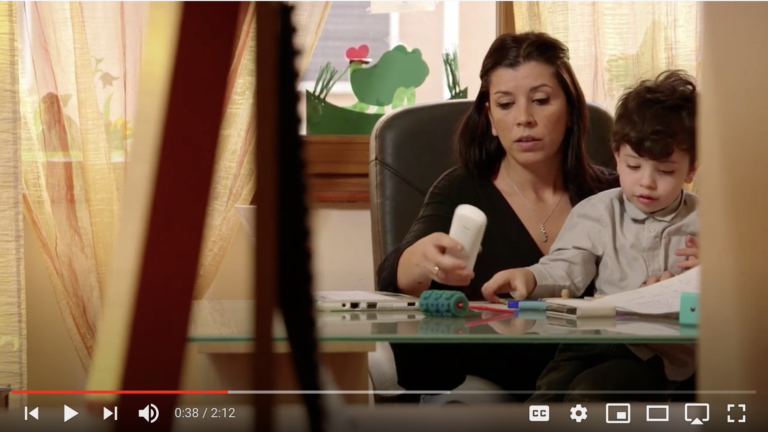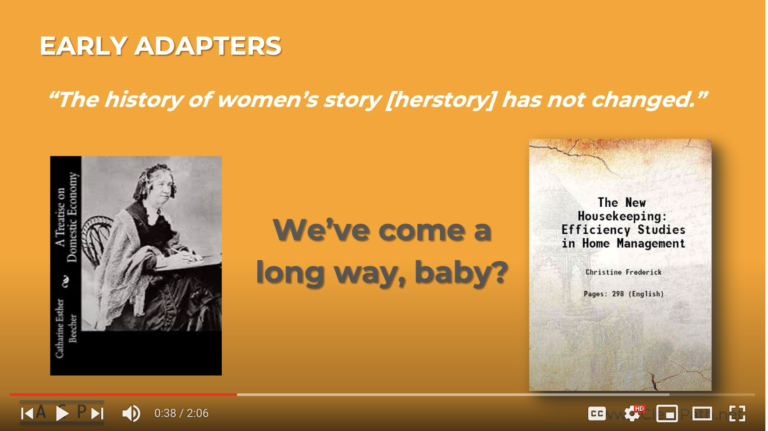VIDEO CLIP ONE: What is Emotional Labor?

Emotional labor is the unseen, unnoticed, unwaged, unwritten, unanticipated work women do at home. There is an old saying, “A man can work from sun to sun, but a woman’s work is never done.” That expression is a hundred and twenty four freaking years old! What exactly is “women’s work” and why the heck is it never done? Finally, we have an answer. It’s called EMOTIONAL LABOR. Emotional labor is the unseen, unnoticed, unwaged, unwritten, unanticipated work women do at home. It is thinking about what’s coming up, tracking birthdays and anniversaries, buying gifts, sending cards, worrying about elderly parents, planning family meals, organizing holiday dinners, noticing when the ketchup is low, and following up on a myriad of delegated tasks to make sure they are actually done. And it is all invisible, making emotional labor hard to appreciate as Work. Not women’s work. Not labors of love. The breakthrough of Emotional Labor: Why A Woman’s Work is Never Done and What To Do About It is that it puts a big, bright red bow on emotional labor and calls it what it is: Work. This is extremely important because the mental weight of emotional labor is the reason a woman’s work is never done. She carries it everywhere she goes, even to her paid job. Appreciating emotional labor gives us insight into physical stress, family discord, household disorganization, and exposes the support and safety nets we all need to live better lives.
VIDEO CLIP TWO: The Narrative

How did the concept of “a woman’s work is never done,” actually end up being women’s work? Does emotional labor really require a vagina? I say, No!! There is the history of women in the home and then there is the narrative, the story about that history that is told over and over again until it sounds like gospel. A woman’s place is in the home was an early one. Or how about this one: My Wife? She’s not working…when in fact she is working…at home…all the time. Or how about this one? Women are just better at emotional labor than men. Actually, they are. You would be too if emotional labor were your responsibility for hundreds of years. With few exceptions (think breastfeeding), emotional labor is not strictly women’s work. It does not wear a skirt, or lipstick, or a bra. It’s just work. And here’s the real kicker. Ask any C-Suite level woman what it takes to run a corporate office or a business and they’ll tell you time management, the ability to plan and anticipate what’s next, good delegation skills, and talking things out. The gender of these skills is not male just as the gender of the skills to run a home is not female. I absolutely believe it is possible to make sharing the work at home a whole lot more equitable.
VIDEO CLIP THREE: Disrupting the Narrative

If the narrative, “a woman’s work is never done,” then what will it take to disrupt the narrative? Since the nature of the work is not gendered (okay, maybe breastfeeding requires gender!) so it would seem that the adults in the household can work (there’s that word again!) to create a more equitable and equal relationship to ALL the work of the household. How do we do that? First, it’s going to be important to acknowledge that you’re about to engage in a process that will take a good bit of time to get on the other side. But it’s possible with ongoing dialogues and attention given to our Emotional Labor Lifecycle which will help you anticipate nearly everything that is bound to come up at home and which someone has to manage. Chances are good you’ll love and appreciate the result of your attention to the details of creating a more equitable distribution of labor.
VIDEO CLIP FOUR: Disrupting The Narrative

In the book we describe what it takes to disrupt the narratives about emotional labor, specifically, ongoing dialogues and using the Emotional Labor Lifecycle. But you’re not going to disrupt the narrative without practicing the kind delegation that eases emotional labor. And the topic we call Make a Difference, the social change to, well, really make a difference for equity for women. Modern households require delegation because the mental burden is heavy, and multi-faceted and unmanageable, and sometimes downright stupid. Typical delegation is often based on who is best at doing what. In the home, hands down women are best at doing most things so that is not a path that promotes equity. There is stuff that needs to be done whether you’re great at it or not. In Emotional Labor: Why A Woman’s Work is Never Done and What To Do About It we challenge you and the other adults in the house to take on the redistribution of necessary work, including work wrapped in emotional labor. COVID exposed deeper rifts in society regarding women’s equity. Affordable day care and an increase in the minimum wage scream for reform. How about short-term income for Moms forced out of the labor market by the demands of a pandemic. And, here’s an idea: a non-gender oriented home equity curriculum for all high school kids! This is how we disrupt the narrative.
